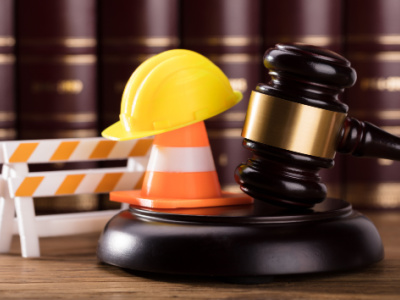Recent Blog Posts
What Are the Potential Outcomes of a Claim for Breach of Contract?
 Litigation involving an alleged breach of contract can be complex. When one party fails to fulfill their obligations as outlined in a contract, this can lead to disputes, and the other party may take legal action to enforce the contract’s terms. For those who are involved in civil litigation related to contract disputes in Wisconsin, it is important to understand the options that may be available. An experienced attorney can provide legal representation in these cases, ensuring that issues related to contracts will be handled correctly. Depending on the specific facts of a case, available remedies for a breach of contract may include:
Litigation involving an alleged breach of contract can be complex. When one party fails to fulfill their obligations as outlined in a contract, this can lead to disputes, and the other party may take legal action to enforce the contract’s terms. For those who are involved in civil litigation related to contract disputes in Wisconsin, it is important to understand the options that may be available. An experienced attorney can provide legal representation in these cases, ensuring that issues related to contracts will be handled correctly. Depending on the specific facts of a case, available remedies for a breach of contract may include:
1. Specific Performance
In some breach of contract cases, the court may order the party who breached the contract to fulfill their obligations as originally agreed upon. Specific performance is typically granted when monetary damages would not adequately compensate the non-breaching party for the losses they suffered due to the breach or when the breaching party has the ability to fulfill the contract’s terms.
Is Arson a Felony Offense in Wisconsin?
 Arson is a serious crime that involves intentionally setting fire to property. In the state of Wisconsin, arson is a felony offense. The severity of the charges and the potential penalties will depend on factors such as the extent of damage caused, whether there were any injuries or fatalities, and the intent behind the act. Anyone who has been accused of arson, property crimes, violent offenses, or other types of crimes can determine how to protect their rights by working with an experienced criminal defense attorney.
Arson is a serious crime that involves intentionally setting fire to property. In the state of Wisconsin, arson is a felony offense. The severity of the charges and the potential penalties will depend on factors such as the extent of damage caused, whether there were any injuries or fatalities, and the intent behind the act. Anyone who has been accused of arson, property crimes, violent offenses, or other types of crimes can determine how to protect their rights by working with an experienced criminal defense attorney.
What Is Arson Under Wisconsin Law?
In Wisconsin, arson is defined under Chapter 943 of the state statutes. According to Section 943.02, a person commits arson if they intentionally damage a building through the use of fire or an explosion without the owner’s consent. The law also covers other forms of arson, including using a fire to damage personal property valued at over $100 (Section 943.03) and setting a fire with the intent to commit fraud against an insurance company (Section 943.04).
When Is Sole Custody an Option in Wisconsin Family Law Cases?
 In Wisconsin, child custody cases can often be complex and emotionally charged. Parents will frequently encounter disputes over sharing custody of their children, including how they will make decisions about important issues. In some cases, a parent may believe that they should have sole custody of their children rather than sharing custody with the other parent. It is important to understand when sole custody may be considered as a viable option by the courts. A parent who is planning to seek sole custody can work with an attorney to determine how to address these issues.
In Wisconsin, child custody cases can often be complex and emotionally charged. Parents will frequently encounter disputes over sharing custody of their children, including how they will make decisions about important issues. In some cases, a parent may believe that they should have sole custody of their children rather than sharing custody with the other parent. It is important to understand when sole custody may be considered as a viable option by the courts. A parent who is planning to seek sole custody can work with an attorney to determine how to address these issues.
What Is Sole Custody?
In Wisconsin, legal custody refers to the ability of a parent to make major decisions regarding the child, such as where the child will go to school, what doctor they will see, whether they can get a driver’s license, or what religion (if any) they might practice. Wisconsin statutes separately define physical placement, which involves how often a child will reside with one or both parents. Sole legal custody typically refers to a situation in which one parent has the responsibility for making major decisions.. The parent with sole legal custody will generally have the right to make all major decisions about the child's upbringing without consulting with or obtaining consent from the other parent.
What Are the Penalties for Auto Theft in Wisconsin?
 Auto theft is a criminal offense that involves illegally taking or operating someone else's vehicle without their consent. In the state of Wisconsin, auto theft is usually charged as a felony offense, and it can lead to serious penalties for those who are convicted of this crime. If you or someone you know has been charged with auto theft in Milwaukee or other parts of Wisconsin, an experienced lawyer can help you understand the potential consequences and your options for defense.
Auto theft is a criminal offense that involves illegally taking or operating someone else's vehicle without their consent. In the state of Wisconsin, auto theft is usually charged as a felony offense, and it can lead to serious penalties for those who are convicted of this crime. If you or someone you know has been charged with auto theft in Milwaukee or other parts of Wisconsin, an experienced lawyer can help you understand the potential consequences and your options for defense.
Operating a Vehicle Without the Owner’s Consent
Under Wisconsin law, it is illegal to drive or operate a motor vehicle without receiving consent from the vehicle’s owner. A person who is accused of taking a vehicle and driving it without permission may face Class H felony charges for a first offense and Class F felony charges for a second offense. Taking and driving a commercial motor vehicle without consent may result in Class G felony charges.
Will Spousal Support Be a Factor in My High Net Worth Divorce?
 During the divorce process, there are numerous complex issues that will need to be addressed. While this is true in any divorce, the financial matters that will need to be addressed in a high net worth divorce can be especially complicated and challenging to resolve. Spousal support is one of the key issues that may arise in these cases. To determine the role that spousal support may play in a high asset divorce, it is important to work with an experienced attorney.
During the divorce process, there are numerous complex issues that will need to be addressed. While this is true in any divorce, the financial matters that will need to be addressed in a high net worth divorce can be especially complicated and challenging to resolve. Spousal support is one of the key issues that may arise in these cases. To determine the role that spousal support may play in a high asset divorce, it is important to work with an experienced attorney.
How Spousal Support Is Addressed in a Wisconsin Divorce
Spousal support, which may also be referred to as maintenance or alimony, consists of payments made by a person to their ex-spouse after the couple’s divorce. In Wisconsin, spousal support is not automatically awarded in every divorce case. Instead, the need for maintenance will be determined based on several factors outlined in state law. These factors include:
What Are the Steps Followed During Civil Litigation in Wisconsin?
 Civil litigation refers to the legal process followed by individuals or entities to resolve disputes through the court system. It can involve a wide range of issues, such as contract disputes, personal injury claims, property disputes, and more. If you find yourself involved in a legal dispute, understanding the steps involved in civil litigation can help you navigate through the process effectively.
Civil litigation refers to the legal process followed by individuals or entities to resolve disputes through the court system. It can involve a wide range of issues, such as contract disputes, personal injury claims, property disputes, and more. If you find yourself involved in a legal dispute, understanding the steps involved in civil litigation can help you navigate through the process effectively.
In Wisconsin, there are several distinct stages of civil litigation. While each case is unique and may have its own complexities, here are the general steps followed when litigating disputes in civil courts:
1. Pre-Litigation Phase
A civil dispute will typically begin when the plaintiff sends a demand letter to the defendant detailing their claims. Before initiating formal legal proceedings, the parties may attempt to resolve the issue outside of court. They may engage in negotiations or mediation to try to reach an agreement without going through a full trial. If disputes can be resolved at this stage, the parties will usually be able to save time and avoid the costs associated with courtroom proceedings.
When Is Drug Possession Charged as a Felony in Wisconsin?
 There are multiple drugs that are classified as controlled substances, and possession can lead to drug charges. While some drug possession offenses are classified as misdemeanors, others may be charged as felonies. A person who is convicted of felony drug possession may face a lengthy prison sentence, large fines, and other penalties. Understanding when drug possession is charged as a felony in Wisconsin is crucial for anyone facing these types of charges. An experienced criminal defense attorney can help defendants in drug crime cases understand their options and ensure that they take the correct steps to avoid being convicted, if possible.
There are multiple drugs that are classified as controlled substances, and possession can lead to drug charges. While some drug possession offenses are classified as misdemeanors, others may be charged as felonies. A person who is convicted of felony drug possession may face a lengthy prison sentence, large fines, and other penalties. Understanding when drug possession is charged as a felony in Wisconsin is crucial for anyone facing these types of charges. An experienced criminal defense attorney can help defendants in drug crime cases understand their options and ensure that they take the correct steps to avoid being convicted, if possible.
Possession of Controlled Substances
Drug crime laws are outlined under Chapter 961 of the Wisconsin Statutes. The severity of a drug possession charge will depend on various factors, such as the type and amount of drugs involved, prior convictions, and whether a person had an intent to distribute the drugs to others.
When Can Assault and Battery Lead to Felony Charges in Wisconsin?
 In the state of Wisconsin, assault and battery offenses are taken very seriously. Depending on the circumstances of an alleged offense, an individual may face misdemeanor or felony charges. Felonies carry more severe consequences, including longer prison sentences and higher fines.
In the state of Wisconsin, assault and battery offenses are taken very seriously. Depending on the circumstances of an alleged offense, an individual may face misdemeanor or felony charges. Felonies carry more severe consequences, including longer prison sentences and higher fines.
If you are facing assault and battery charges in Wisconsin, it is crucial to understand when these offenses can lead to felony charges. This knowledge can help you make informed decisions regarding your case. By seeking legal representation from an experienced criminal defense attorney, you can determine your best options for defending against a conviction.
Defining Assault and Battery
Before diving into the specifics of felony charges, it is important to understand what the terms "assault" and "battery" refer to. Assault generally involves actions that cause someone to reasonably fear they will experience imminent bodily harm or death. Battery, on the other hand, involves intentional physical contact that causes bodily harm or injury.
What Issues Can a Prenuptial Agreement Address in Wisconsin?
 A prenuptial agreement, also known as a “prenup” or a marital property agreement, is a legal contract that a couple agrees to before they get married. This type of agreement may address the division of assets and debts or other financial matters in the event of a divorce or separation. While prenuptial agreements are not romantic topics to discuss, they can provide clarity and protection for both parties if their relationship breaks down in the future.
A prenuptial agreement, also known as a “prenup” or a marital property agreement, is a legal contract that a couple agrees to before they get married. This type of agreement may address the division of assets and debts or other financial matters in the event of a divorce or separation. While prenuptial agreements are not romantic topics to discuss, they can provide clarity and protection for both parties if their relationship breaks down in the future.
Property Division
One of the main purposes of a prenuptial agreement is to address the division of property in the event of a divorce or the death of either spouse. Wisconsin is a community property state, which means that any property acquired during the marriage is generally considered marital property and is subject to equal division between the spouses. However, a prenup can override this default rule and allow the couple to address issues related to their property in advance of a divorce or separation.
How Can Litigation Address Issues Affecting Construction Projects?
 Construction projects can involve multiple types of complex concerns. Numerous different parties may play a role in these projects, including property owners, architects, contractors, subcontractors, suppliers, and engineers. With so many moving parts, it is not uncommon for issues to arise during a construction project. These issues can range from contract disputes to construction defects and delays.
Construction projects can involve multiple types of complex concerns. Numerous different parties may play a role in these projects, including property owners, architects, contractors, subcontractors, suppliers, and engineers. With so many moving parts, it is not uncommon for issues to arise during a construction project. These issues can range from contract disputes to construction defects and delays.
Construction litigation is one way to address these issues and seek resolution. By taking legal action, the parties involved in a construction project can protect their rights and interests while seeking compensation for any damages incurred. An attorney who is experienced in matters related to construction law can provide guidance on whether litigation may be necessary or whether there may be other options for resolving disputes.







